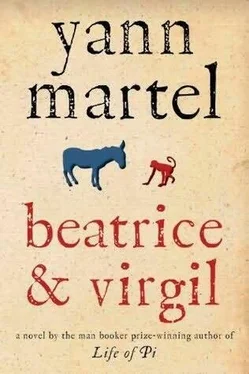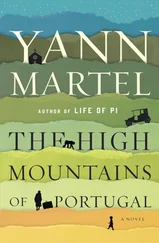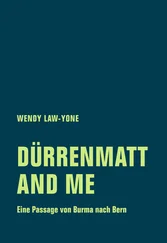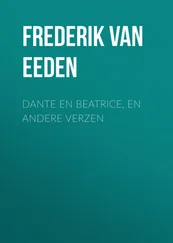Yann Martel - Beatrice and Virgil
Здесь есть возможность читать онлайн «Yann Martel - Beatrice and Virgil» весь текст электронной книги совершенно бесплатно (целиком полную версию без сокращений). В некоторых случаях можно слушать аудио, скачать через торрент в формате fb2 и присутствует краткое содержание. Жанр: Современная проза, на английском языке. Описание произведения, (предисловие) а так же отзывы посетителей доступны на портале библиотеки ЛибКат.
- Название:Beatrice and Virgil
- Автор:
- Жанр:
- Год:неизвестен
- ISBN:нет данных
- Рейтинг книги:5 / 5. Голосов: 1
-
Избранное:Добавить в избранное
- Отзывы:
-
Ваша оценка:
- 100
- 1
- 2
- 3
- 4
- 5
Beatrice and Virgil: краткое содержание, описание и аннотация
Предлагаем к чтению аннотацию, описание, краткое содержание или предисловие (зависит от того, что написал сам автор книги «Beatrice and Virgil»). Если вы не нашли необходимую информацию о книге — напишите в комментариях, мы постараемся отыскать её.
A famous author receives a mysterious letter from a man who is a struggling writer but also turns out to be a taxidermist, an eccentric and fascinating character who does not kill animals but preserves them as they lived, with skill and dedication – among them a howler monkey named Virgil and a donkey named Beatrice…
Beatrice and Virgil — читать онлайн бесплатно полную книгу (весь текст) целиком
Ниже представлен текст книги, разбитый по страницам. Система сохранения места последней прочитанной страницы, позволяет с удобством читать онлайн бесплатно книгу «Beatrice and Virgil», без необходимости каждый раз заново искать на чём Вы остановились. Поставьте закладку, и сможете в любой момент перейти на страницу, на которой закончили чтение.
Интервал:
Закладка:
"There you go," said the waiter.
"Thank you."
Henry realized that he had forgotten to ask for two forks. He took the single fork that the waiter had brought and cut the pastry into several pieces. He placed the fork on the taxidermist's side of the plate. He would use his coffee spoon instead.
"Help yourself," Henry said.
The taxidermist shook his head. He brought the play back above the table.
"'Those criminals…'" Henry repeated. The taxidermist nodded and continued:

Henry was struck by the irony of the timing. Just as coffee and cake were delivered to them, Virgil and Beatrice mourn their absence. And earlier Beatrice had said how the sun had gone, leaving them without faith, and here they were basking in the sun. It also struck him how naked and alive Virgil and Beatrice were, so much more revealing of themselves than their author.
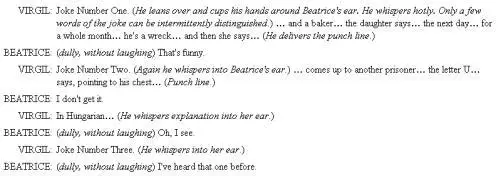
"They have conversations like that at first," the taxidermist said. "A mixture of passing the time and figuring out what they should do next."
"I like the jokes being whispered. That's good."
"They also speak on their own at times. Soliloquies. Beatrice can still manage restful sleep, even whole nights, and with dreams too. Virgil, however, is a poor sleeper. He always has the same dream: a noise-a boring-that slowly gets louder until he wakes up with a gasp, his eyes popping open like burst balloons, as he puts it. He jokes that he's always dreaming about termites. It's the anxiety."
"Why is Virgil so anxious?"
"Because he's a howler monkey in a world that doesn't want howler monkeys."
Henry nodded.
The taxidermist continued. "When Beatrice is sleeping, Virgil sometimes talks to himself. In the middle of their first night next to the tree, he wakes up and talks about a book called Jacques the Fatalist and His Master."
"Yes, by Denis Diderot," Henry said. A French classic from the eighteenth century. He'd read it long ago.
"I didn't understand it at all," the taxidermist said.
Henry tried to remember the novel. Jacques and his master travel around on their horses, talking about this, that and the other. They tell stories, but are constantly interrupted by events. Jacques is presumably a fatalist and his master is not, though Henry couldn't vouch for it from memory, only assumed so from the title. He couldn't recall having especially "understood" the novel. He remembered only the Gallic lightness and the modern, comic feel of it, a bit like Beckett on horseback.
"Why do you make reference in your play to a novel you didn't understand?" Henry asked.
The taxidermist replied, "I'm not bothered by that fact. I use it because there's an element in it I found useful. Jacques and his master have a discussion on the various injuries a body can suffer and the pain that goes with each. Jacques strongly argues that a knee injury is the champion of hideous, unbearable pains. Virgil can't remember if the example Jacques gives is of falling from a horse and hitting one's knee against a sharp rock or of receiving a musket shot in it. Whatever the case, it convinced Virgil when he read the book. But now, during his soliloquy, he mulls over the measuring and comparing of physical pains. He grants that the kind of knee pain described by Jacques would be blinding, but it would also be a jolt, short and powerful at the moment of impact, but then greatly reduced. How does that compare with the grinding, hindering pain of a bad back? A knee is small, locally linked and comparatively easy not to use. 'To put one's feet up and relax'-the pleasure of not using one's knees is even celebrated in a cliche. But the back is a real railway hub, connected to everything, demands constantly made upon it. And what about the pain of thirst and hunger? Or that entirely different kind of pain, the one that injures no particular organ yet kills the spirit that links them? At this point, Virgil starts to weep but he stops himself so that he doesn't wake Beatrice. This is one soliloquy he has during the play."
"I see."
"He has another one that morning, while Beatrice is still sleeping. Virgil remembers how their miseries started. Started in his mind, that is, the moment when he realized what was happening to them. He acts it out. He's reading his morning paper at his favourite cafe and his eyes are drawn to one of the headlines. The headline announces a government edict concerning new categories of citizens-or rather, as the article makes clear, a category of citizens and a new category of non -citizens. Virgil reads with increasing astonishment as he realizes that he-he himself personally, in all his specific details, this monkey sitting in a cafe reading a paper, such an ordinary thing-is the exact and intended target."
Henry took mental note: a government edict excluding Virgil. He didn't want to interrupt the taxidermist, who was becoming quite animated. A customer or two glanced over casually. But it was the waiter returning to their table that had an effect on the taxidermist. He brought his hands into his lap and looked down.
"Do you need any help?" the waiter asked Henry. He corrected himself: "Can I get you anything else?"
"No, I'm fine, thank you. Would you like a refill?"
The taxidermist said nothing, only shook his head slightly. He seemed to be pretending he wasn't there.
"I'll just have the bill, please."
"Yes, of course."
Henry had the sense the waiter was about to talk to the taxidermist, but changed his mind and walked away instead.
The taxidermist was bent on finishing his description of Virgil's cafe scene. He continued rapidly.
"It's the expulsion from Eden! The Fall! In an instant, the newspaper is transmogrified into a giant finger floating in the air, pointing at him. Virgil is filled with apprehension that other patrons at the cafe, many of them reading the same newspaper, will notice him. Why, over there and over there, didn't they just glance at him? That's how the events entered his life, he laments, as they had entered the lives of so many others, a vast and varied group that included him and Beatrice and others and others and others: with a single moment of realization. In that moment the world shattered like a pane of glass, so that everything looked exactly as it had earlier, and yet was different, now clear and newly sharp with menace. After that-"
The waiter reappeared with the bill. Remarkably quick of him, Henry thought. Was he wanting to get rid of us? He paid and they stood up. With the taxidermist being mid-story there was nothing to do but walk towards his store. Though so close, it felt like a different world. Hardly anyone was walking by and it was much quieter than the more commercial end of the street. Henry was disappointed to see black fabric hanging down each of the bay windows. The effect upon turning the corner, which he was looking forward to, was utterly different. In fact, with no okapi peeking out, there wasn't much of an effect at all. Just a fading jungle mural on a brick wall. The taxidermist noticed him looking at the black fabric.
"I don't want people lingering about when the shop is closed. You never know with people," he said, as he fished for keys in the pocket of his coat. He looked around as he said that, scanning the few people who were passing by-a middle-aged couple, a slouching teenager, a lone man.
"You don't like people, do you?" Henry said, which he meant lightly.
The taxidermist looked at the passersby for another moment, then turned his gaze onto Henry-and it was a pinpoint of concentration wholly focussed on him, animal-like in its intensity, exactly that, animal-like. As the taxidermist bore into him with his steady eyes, a single thought occurred to Henry: I am people.
Читать дальшеИнтервал:
Закладка:
Похожие книги на «Beatrice and Virgil»
Представляем Вашему вниманию похожие книги на «Beatrice and Virgil» списком для выбора. Мы отобрали схожую по названию и смыслу литературу в надежде предоставить читателям больше вариантов отыскать новые, интересные, ещё непрочитанные произведения.
Обсуждение, отзывы о книге «Beatrice and Virgil» и просто собственные мнения читателей. Оставьте ваши комментарии, напишите, что Вы думаете о произведении, его смысле или главных героях. Укажите что конкретно понравилось, а что нет, и почему Вы так считаете.
